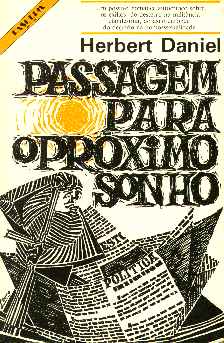

Read this book in full, entirely free
Click here to download!
(only in portuguese)

- Passage to the Next Dream is "a possible self-critical novel
about the exiles: of banishment in clandestine militancy, of European
asylum, of exile in homosexuality".
- The preface, on the dust jacket of the book, has the criativity of
the text of his friend, the cartonist Henfil, brother of Herbert de Souza
("Betinho").
- In his first book, autobiographical, Herbert Daniel conceptualizes
and probes the first three exiles that he passed through before then. The
book was finished in May of 1981, when he already was in exile in Paris,
five months before his return to Brazilian soil. The illustration on the
cover was conceived by ClŠudio Mesquita, graphic artistic and his life
campanion, who illustrated seven covers of the eight books published by
Herbert Daniel.
- Herbert Daniel wrote the unfeigned text of his baggage of so many
memories without the jornalistic intention of creating a register of
memories or register of an age. Its actions , his history, far from being
analyses of an age, are reflections on stories vivid in our history.
- His need for interlocutors, for dialogues, made him write the
good-humored and curious "tales" of a sad history of a society at bay,
silent and unprepared... or of some few who armed themselves with courage
and indignation. Herbert Daniel shared his stories and reflections that
described the motive that led some hundreds of young men to rebel
quixotically and millions of others to remain silent before a totalitarian
state, of the unpreparedness of the left and its desperate subsistence.
- He recounts the myth of a generation already distant... of our
fathers; certainly facts that never should be forgotten for the
comprehension and the perception of current socio-political facts. He
recounts thrilling "tales" of his participation in the kidnappings of two
ambassadors and explains the origins of the revolutionary groups that were
forming hardily and succumbing because of the prisons, tortures and deaths.
He recounts his inexplicable and awkward escapes from the military cordons
that hunted him eagerly, dedicating him to death.
- He also writes to us of how destiny presented him to ClŠudio Mesquita,
friend revered as his life partner, companion of so many joys, many
sadnesses and difficulties, brother until the last day of life. In the pages
of his remembrances he relates emotions and torments shared by two,
clandestine with ClŠudio, and the rediscovery of his homosexuality,
suffocated by his asexual political militancy in the lands of a foreign
exile.
- Of the patriotic exile, he threaded his discourse with strong human
focus, inserting homosexuality in the list of questions debated by the left,
proceeding from his thoughts of the ghetto and homosexual life in Paris,
where he worked as porter in a sauna. His instruments of perception are the
passersby, the clients, the daily life of the underworld of the ghetto, and
he narrates to us one more series of good-humored "tales" which impel us to
democratic reflection about banishment, the fear of a socio-political
reality of oppressors and oppressed, of prejudices and discriminations.
Herbert Daniel perceived and notated the banishment of a sexuality "that he
did not consider a sexual difference, a sexual quality, but fundamentally a
social difference", therefore, political. Those years, which appear to be
the history of a distant land, of hatreds and guerillas... were only there,
nearby, yesterday, and anachronistically lay bare the political relations
little different, in substance, of the Brazil of today.

MAIN PAGE  BIOGRAPHY
BIOGRAPHY  THE EXILES
THE EXILES  PHOTOS
PHOTOS  SOUNDS EXCERPTS
SOUNDS EXCERPTS  LINKS
LINKS
WEBMASTER  LET'S BRING THIS HISTORY TO LIFE ?
LET'S BRING THIS HISTORY TO LIFE ?
HERBERT DANIEL FOUNDATION






 NEXT BOOK
NEXT BOOK
 BIOGRAPHY
BIOGRAPHY  THE EXILES
THE EXILES  PHOTOS
PHOTOS  SOUNDS EXCERPTS
SOUNDS EXCERPTS  LINKS
LINKS